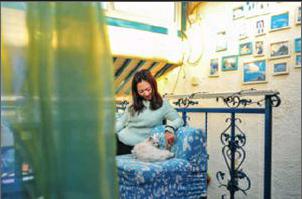The Meow Factor
2015-01-15ByEricDaly
By+Eric+Daly

Spending time in Sirenas upstairs loft area, one could be forgiven for thinking he or she had walked onto the set of Wes Andersons 2004 movie The Life Aquatic With Steve Zissou. The cozy Beijing cat cafés interior decoration is best described as “nautical kitsch,”carrying a color motif of whites coupled with shades of blue and aquamarine. Downstairs, a giant mobile featuring silver fish overhangs the interior of the front door. Upstairs, the wall to the immediate left is adorned with faded wanted posters of characters from pirate-themed anime One Piece and on the opposite wall are hung photographs of Mediterranean villas.
“The cats mainly sleep upstairs at night and we provide food, water and toilet facilities for them,” said the cafés manager, 31-year-old Li Xia. Li was hiply attired in a baggy acrylic green polo neck jumper and skintight leather pants, and sporting designer glasses. Inside, the café is warm, and softly lilting bossa nova music contributes to a soporific atmosphere. Fast asleep next to her lie two of the cafés 10 kitties: a white cat and a calico—both longhairs.
With three fur babies of her own, Li was formerly a customer of the 2011-founded establishment before taking over as manager one year ago, having befriended proprietor Zhang Lange. In a previous life, she was a corporate event planner.
A furocious craze
When Beijing Review inquired whether cat cafés are on the up or in decline in Chinas capital, Li replied that business is “booming,” though she admitted to fearing over-saturation. The phenomenon has its roots in Asia—a part of the world long engaged in a profound love affair with all things feline. In 2000, a Hello Kitty promotion by McDonalds prompted a full-scale riot in Singapore as fans vied with one another for the collectibles on offer.
The first cat café recorded, Cat Flower Garden, opened its doors in Taiwan in 1998 and drew the attention of tourists from Japan, where the fad quickly spread with Tokyos first such café opening in 2004. In many establishments, patrons are subject to a cover charge, making the business a form of pet rental. A chain of cat cafés, Cat Attic, is now proliferating across South Korea, and similarly themed coffee shops operate in Malaysia and Thailand. One idiosyncratic venture in Japan has even added goats for variety.
Sixteen years on, though it has taken somewhat longer to catch on in the West, the concept is now spreading like a case of the fleas. Cat cafés exist in 14 countries in Europe, including tourist destinations such as London and Paris. Across the pond, feline-themed coffee houses are open, or due to open, in 17 cities, towns and regions in North America, covering major metropolises such as Toronto, New York and San Francisco. Similar ventures are also scheduled to open for business in Australia and the Bahamas. In short, the industry appears to have come within a whisker of conquering the entire planet.endprint
Clawing back a profit
Li informs us, that unlike other cat cafés, Sirena was not originally intended to be a cat café. Having visited Greece, Zhangs original ambition was simply to open a Mediterranean-style coffee bar. An avid cat lover, she encouraged strays to come inside and quickly found that they were a draw for customers. The rest is history. In addition to the café, Zhang has also founded two sister businesses also under the Sirena moniker: a gastropub and a boutique hotel.
Like in most major cities, life for cafés, bars and restaurants in Beijing is brutally competitive. This time last year, the English-language enter- tainment and listings magazine The Beijinger ran a list of the “10 Bars Well Miss in 2014,”indicating that neither excellent service nor prime location necessarily provides insulation against failure. Since Sirena is situated along the chic renovated Wudaoying Hutong close to the tourist-heavy Yonghegong Lama Temple area, one can surmise rent cant be cheap and the abundance of cafés nearby means no shortage of local competition. So how many of its nine lives does Sirena have left?
“We have no special advantages,” Li asserted modestly. She suspects, however, that the reason why customers keep on coming back is the attentive yet unobtrusive service. Li stated that their patrons are welcome to stay for as long as they please during the cafés daily opening hours of 11 a.m-2 a.m., and there is no pressure to buy anything. A section of the cafés upstairs area comes replete with a phone, allow-ing customers to call in their order downstairs, so as to prevent shouts for service from disrupting Sirenas tranquil atmosphere.
Li intimates that the business is indeed profitable, helping them to avert financial catastrophe. For a start, the costs of upkeep for Sirenas star attractions are not especially daunting. Every month, the cafés cats are washed and they receive annual vaccinations. Factoring in food, trips to the vet and of course, kitty litter, Li estimates total costs of 2,000 yuan ($323) per month.
Although the café has a leisurely turnover, with 70 customers spending two to three hours there daily, the average spend is high at 50 yuan($8). Coffee-wise, Sirena provides the usual fare of espresso, cappuccino and mocha, as well as a selection of desserts. A cup of coffee will set you back between 30-35 yuan ($4.85-5.65), which is only slightly above par in a city where a Starbucks Grande Latte costs 27 yuan ($4.36), indicating customer fidelity and good return business. All in all, the café looks to have sunk its claws into a viable industry.endprint

A select clientele
When asked about the cafés typical crowd, Li tells Beijing Review that they are a varied bunch. One encounters the de rigeur art- and literature-oriented set, as well as white-collar workers for whom Sirena offers the purrfect getaway. Li stated the latter find interacting with the cats relaxing and having inhabited the corporate sphere for a number of years, she can certainly empathize. The café also served as the backdrop of a weeklong series of World Cupthemed programs by Hainan-based TV station The Travel Channel this summer gone.
One not-so-typical demographic comprises parents and their young children. In Beijing, living space is often tight for families and apartment living precludes keeping an outdoor pet. The city government has also put regulations in place such as banning the ownership of dogs above 35 centimeters in height—on all fours, not on hind legs—in central areas. Thus, parents often bring their offspring along to experience the delights of interacting with animals and places such as Sirena provide such a muchneeded outlet for this.
When asked if Beijings “little emperors or empresses” are ever tempted to tease the cats or, say, pull their tails, Li responded in the affirmative, although her attitude is eminently forgiving. “They think its just playing,” she stated, before adding that the cats have no shortage of places to escape such harsh treatment. As opposed to other cat cafés in China and abroad, Sirena charges no cover fee.
One customer took cat enthusiasm to a whole new level by walking out of the café with one of its furry inhabitants in his bag! Tragically, the animal was never seen or heard from again, though Li remains upbeat about the cats present well-being and bears the cat-napper no ill will. “I think he took it out of love,” she said. Amazingly, that was only one of two times that a cat has gone missing from the café in almost four years of business. Outside and inside the front entrance, signs read: “Big cats inside! Please keep door closed.”
Ask the expert
Downstairs in the café, a lady uses her digital camcorder to tape two cats pouncing playfully at one another, and appears to be enjoying proceedings. She introduced herself as Isabelle Marina Marcq, a cat behaviorist originally from Belgium but now based in the south of France. She has also lived in Italy, speaks fluent Italian, and is conducting independent research for the bioethics committee of ANMVI, the Italian national association of veterinarians. She has come to China to study pet behavior and learn some Mandarin in the process.
“That one, he is not willing to interact,” she said, pointing to a white longhair perched on top of an air conditioning unit overhead, who occasionally interrupted his slumber to fix us with an indignant glare. She praised the cafés design, singling out the cat climbing frames and scratching posts downstairs, in addition to the many other high places where the cafés feline residents can go when they do not wish to mingle with their human counterparts.
Marcq has been impressed with Chinese pet owners treatment of their charges and stated large dogs in China are much quieter and better behaved than their Western counterparts. She said the pet-related magazines available in China are of top-notch quality and was charmed by owners conduct at the China International Pet Show she attended in Beijing from November 17 to 20. “The animals there seemed alert and alive; in Europe, they sometimes use tranquilizers for competitions,” she claimed.endprint
